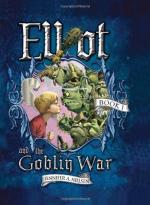“Oh, I dinna ken, Rob, but jist thought you micht hae kent something,” she answered evasively.
“No, I dinna ken onything at all aboot her, mither,” he said. “If I had kent onything, dae you think I’d hae kept quiet?”
“Oh, I dinna mean that, Rob,” she replied with relief in her voice, “but I thought that you might hae heard something. That Leezie Johnstone was in here the day, an’ you ken hoo she talks. She was makin’ oot that Mysie had gane wrang, and had ran awa’ tae hide it.”
“Leezie Johnstone had little to do sayin’ onything o’ the kind,” he said with some heat in his voice. “There never was a dirty coo in the byre but it liket a neighbor. I suppose she’ll be thinkin’ that a’ lasses were like her. These kind of folk hae dam’d strange ideas aboot things. They get it into their heads it is wrang to do certain things when folk are no married, but the cloak of marriage flung aboot them mak’s the same things richt. They hinna the brains o’ a sewer rat in their noddles, the dam’d hypocrites that they are!”
“Dinna swear, Rob!” said Mrs. Sinclair, interrupting him. “Do you ken,” she went on, her astonishment plainly evident in her face and voice, “that is the first time I ever heard you swear in a’ my life!”
“Well, mither, I am sorry; but I couldna’ help it. Folk like that get my temper up gey quick; because they get it into their heids that marriage makes them virtuous, even though they may be guilty o’ greater excesses after than they were before marriage.”
“Ay, that’s true, Rob!” she agreed. “But it is a sad business a’ thegether. I wonder what has come owre the bit lassie. God knows where she may be?”
But Robert was silent, and no matter how much she tried to get him to speak, he would not be drawn into conversation, but answered merely in short grunts; but she could see that he was very much disturbed at what had happened. After a few days the sensation seemed to pass from the minds of most of the villagers, who soon found something new to occupy them, in connection with their own affairs.
About this time much interest was being manifested in mining circles. The labor movement was beginning to shape itself into solidarity towards political as well as industrial activity. Robert Smillie and the late J. Keir Hardie, and many other tireless spirits, had succeeded in molding together the newly created labor party, infecting it with an idealism which had hitherto not been so apparent, and this work was making a deep impression upon the minds of the workers, especially among the younger men.
The Miners’ Union had been linked up into national organizations; and a consolidating influence was at work molding the workers generally, and the miners particularly, imbuing them with a newer hope, a greater enthusiasm and a wider vision.
About a fortnight after the news of Mysie’s disappearance, Keir Hardie paid a visit to Lowwood, and a large crowd gathered to hear him in the village hall. Smillie also was advertised to speak, and great interest was manifested, and much criticism passed by the miners.




